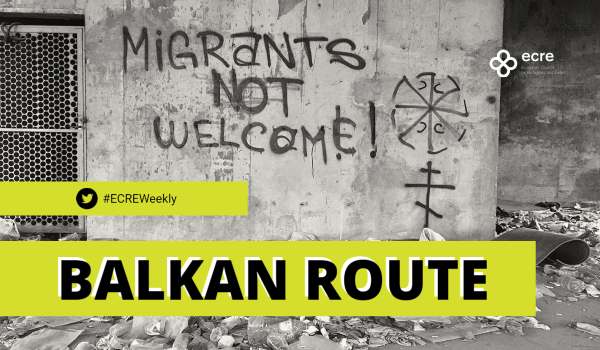According to the European Border and Coast Guard Agency (Frontex) irregular arrivals through the Western Balkan route has seen a significant increase in the first part of 2022. Meanwhile, a recent report by the UN Special Rapporteur on the Human Rights of Migrants reveals continued pushback practices along the route. The European Court for Human Rights (ECtHR) has ruled that Hungary exposed a family to inhumane and degrading treatment.
Frontex has registered an increase in irregular entries into the block from the Western Balkans. According to its latest data, 86,420 irregular entries were detected between January and May this year at the European Union’s external borders. In May last year, Frontex registered around 23,500 irregular crossings. The agency said that this total number of irregular entries marked a rise of 82% compared to the same period last year, making the Western Balkans route one of the most active migratory routes into the EU together with Central Mediterranean and Eastern Mediterranean routes. Frontex added that most of the people detected had been in the Western Balkans already for some time before seeking to enter the EU and mostly from Syria or Afghanistan. As stated by ECRE, the “question remains what would be the safe and legal alternative?” for people on the move in along the Balkan route.
Mounting evidence over recent years and a newly released report by UN Special Rapporteur on the Human Rights of Migrants, Felipe González Morales reflect the dire situation for: ”Migrants in the Balkans and Central Eastern Europe” who throughout 2021 :”continued to face widespread pushback and chain pushback practices at most borders”. The rapporteur refers to Croatia’s continued removal of asylum seekers to “Bosnia and Herzegovina and Serbia, both informally and as part of bilateral readmission agreements” as well as continued pushback practises “at the borders between Hungary and Serbia, Romania and Serbia, Serbia and North Macedonia, and North Macedonia and Greece”.
On 2 June by the ECtHR has condemned Hungary of inhuman and degrading treatment of an Iraqi family. The family in question was detained for five months in the transit zone between Hungary and Serbia that was abolished following a Court of Justice of the European Union (CJEU) judgement in May 2020 without access to legal remedy. ECtHR found that the conditions of detention for the children and the mother amounted to inhuman and degrading treatment, whereas the use of handcuffs and leash on the father was unjustified and has diminished his human dignity. All these practices are considered violations of Articles 3 (prohibition of inhuman or degrading treatment) and 5 §§ 1 (right to liberty and security) and 4 (right to have lawfulness of detention decided speedily by a court). “While the ruling of the Court does not erase the traumatic memory of those almost 5 months spent in detention, it does confirm that what the detained children and their parents experienced as inhuman is in fact considered inhuman and degrading according to the law. The judgment is also important in a more general sense, because the Court has once again aligned itself with the judgment of the Court of Justice of the European Union issued in May 2020, which declared that placement in transit zones qualifies as detention, and moreover as unlawful detention. This can give hope to the many clients of the Hungarian Helsinki Committee who are still awaiting the Court’s decision in their pending cases” – said Barbara Pohárnok, from ECRE member Hungarian Helsinki Committee and legal representative of the Iraqi family.
The new government of Slovenia announced on 10 June its plan to dismantle the border fence along with Croatia by the end of the year, which was initially put in place to curb irregular migration into the country through the Balkans in 2015 and 2016.
For further information:
- ECRE, Balkan Route: Years of Pushbacks Condemned, Ombudsman Slams Commission Failure on Croatian Funding, Asylum Shortcomings in Serbia, Hungarian Border Violence, March 2022
- ECRE, Balkan Route: New Croatian Pushback Revelations, Mistreatment of People in Transit, States Block Afghans but Declare Hospitality Vis-à-vis Ukrainians, February 2022
This article appeared in the ECRE Weekly Bulletin. You can subscribe to the Weekly Bulletin here.

